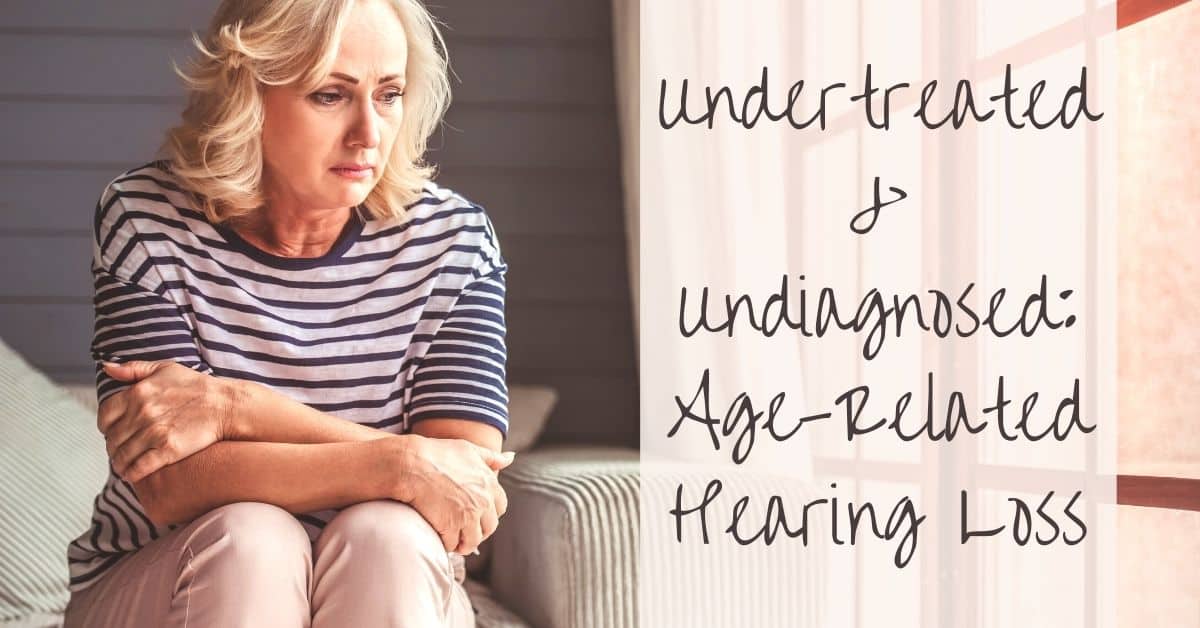
Although age-related hearing loss is incredibly common, many people soldier on without receiving the treatment they need. Why do so many people have undertreated and undiagnosed age-related hearing loss?
The reasons are as diverse as the people who face the condition. Let’s take a moment to remember what age-related hearing loss is. This form of hearing loss faces nearly everyone who reaches the senior years, but the extent of age-related hearing loss can be quite different. In a nutshell, the sensitive cells of the inner ear die with time.
We don’t know exactly why this deterioration happens. Some say that it is due to exposure to sound over the course of a lifetime. Others find it to be akin to noise-related hearing loss. Still others point to free radicals, or correlations with other health conditions, such as cardiovascular disease or diabetes, or lifestyle factors such as smoking.
Although it is unclear exactly why these cells of the inner ear die over time, the fact remains that most people will have some form of hearing loss if they are fortunate enough to reach the elder years.
Why Age-Related Hearing Loss is Undiagnosed
Although many people are wise enough to get a hearing test as soon as hearing loss seems to be taking place, people put off getting a test for a range of reasons. In the first place, many people do not want to admit to themselves that they have hearing loss. Others are afraid that their families, friends, or loved ones will judge them.
That fear of judgment includes the worry that others will treat you as if you are incapable, feeble, or even unable to understand what is going on. Truly the tragedy is that treatment for hearing loss is the only way to remedy those experiences. Simply refusing to admit to hearing loss is not enough to turn back the clock.
Other people might have skepticism about the treatment process or worry that it will make them seem older than they are. In reality, hearing treatment is more likely to make you seem younger by enabling you to re-engage with the people close to you.
Why Age-Related Hearing Loss is Undertreated
For many of the same reasons, people are not only reluctant to get a hearing test and diagnosis but also hesitant to pursue treatment. There is some persistent mythology about hearing aids and other forms of hearing loss treatment. In the first place, hearing aids have changed remarkably over the years.
New technologies and designs make it so that they barely resemble the older models of years gone by. The latest hearing aids appear more like wireless earbuds or Bluetooth receivers, and it is quite common to see people using these devices nearly everywhere you go.
One of the myths about hearing aids is that they are cumbersome and lacking functionality. If you have talked to anyone with hearing aid feedback, whistling, or too much amplification, then you might recognize these former issues with hearing aids. Of course issues can arise, but the latest hearing aid technology has tackled these problems in remarkable ways.
Some believe that hearing aids will be too expensive for their budgets, but payment options in a range of costs make them more affordable than ever. Furthermore, most wearers find that the benefits of hearing aids far outweigh the costs.
What to Do about Undiagnosed and Undertreated Hearing Loss
If you are concerned that you have a loved one with undiagnosed or undertreated hearing loss, the time is now to engage in a conversation. Choosing the right context for this conversation is half the battle, making sure your loved one feels comfortable, at ease, and above all is able to hear well enough to effectively communicate.
When you have the conversation, try using open-ended questions and always remind your loved one that you have their wellbeing in mind. The best way to restore a connection with a loved one who has hearing loss is to enable freely flowing conversations without the distance imposed by not being able to hear one another. Once you have this conversation, the only missing piece is scheduling the appointment for a hearing test!
